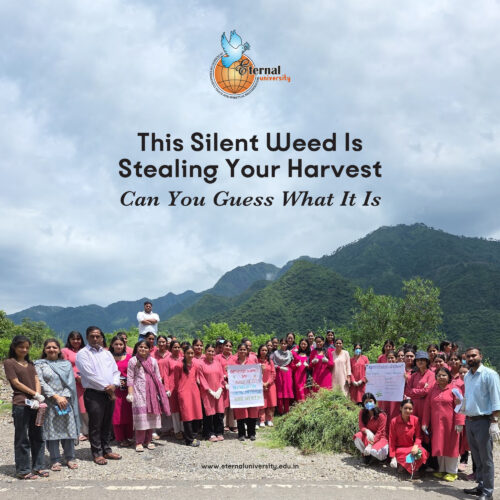It looks harmless at first glance—a simple green plant growing along roadsides and farm edges. But beneath that innocent appearance lies one of India’s most dangerous invasive species: Parthenium hysterophorus, commonly known as Congress Grass.
Introduced accidentally in the 1950s through contaminated wheat imports, this aggressive weed has silently invaded millions of hectares of farmland across India. It’s more than a nuisance—it’s a health hazard and ecological threat.
From skin allergies and respiratory problems to choking crop growth and reducing soil fertility, Parthenium is robbing farmers of their harvests and biodiversity of its balance.
Eternal University Leads the Charge
In response to this growing concern, the Department of Agronomy at Eternal University, Baru Sahib, organized Parthenium Awareness Week, dedicated to educating students and farmers about this silent menace.
The campaign combined knowledge with action—students actively participated in identifying Parthenium-infested areas, learning control methods, and spreading awareness about safe removal practices.
From manual uprooting to using targeted herbicides, and even introducing beetles (Zygogramma bicolorata) as natural biological control agents, the week-long activities showcased innovative and eco-friendly ways to manage the spread of this invasive weed.
A Movement for Sustainable Agriculture
The event wasn’t just an academic exercise—it was a movement for environmental stewardship. By engaging youth in hands-on learning, Eternal University reinforced the importance of sustainable agriculture and ecological balance.
The participation of agronomy students symbolized a new generation of farmers and scientists ready to take charge—protecting crops, ecosystems, and the future of India’s agriculture.
Join the Fight Against Parthenium
The war against this invasive weed is far from over. Every citizen—student, farmer, and policymaker—has a role to play in eradicating Parthenium and restoring the health of our fields.
Spread the word. Stay informed. Support eco-friendly agricultural practices.
Because saving our crops today means securing our tomorrow.












Add comment